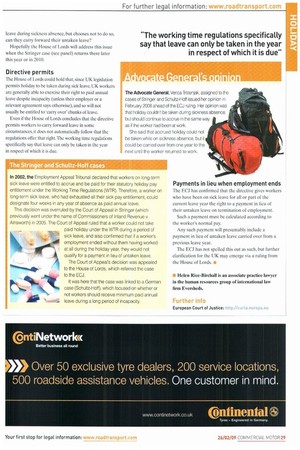The Stringer and Schultz-Hoff cases
Page 29

If you've noticed an error in this article please click here to report it so we can fix it.
In 2002, the Employment Appeal Tribunal declared that workers on long-term sick leave were entitled to accrue and be paid for their statutory holiday pay entitlement under the Working Time Regulations (VVTR). Therefore, a worker on long-term sick leave, who had exhausted all their sick pay entitlement, could designate four weeks in any year of absence as paid annual leave.
This decision was overruled by the Court of Appeal in Stringer (which previously went under the name of Commissioners of Inland Revenue v Ainsworth) in 2005. The Court of Appeal ruled that a worker could not take paid holiday under the WTR during a period of sick leave, and also confirmed that if a worker's employment ended without them having worked at all during the holiday year, they would not qualify for a payment in lieu of untaken leave.
The Court of Appeal's decision was appealed to the House of Lords, which referred the case to the ECJ.
It was here that the case was linked to a German case (Schultz-Hoff), which focused on whether or not workers should receive minimum paid annual "4...aagita leave during a long period of incapacity.
















































































































































